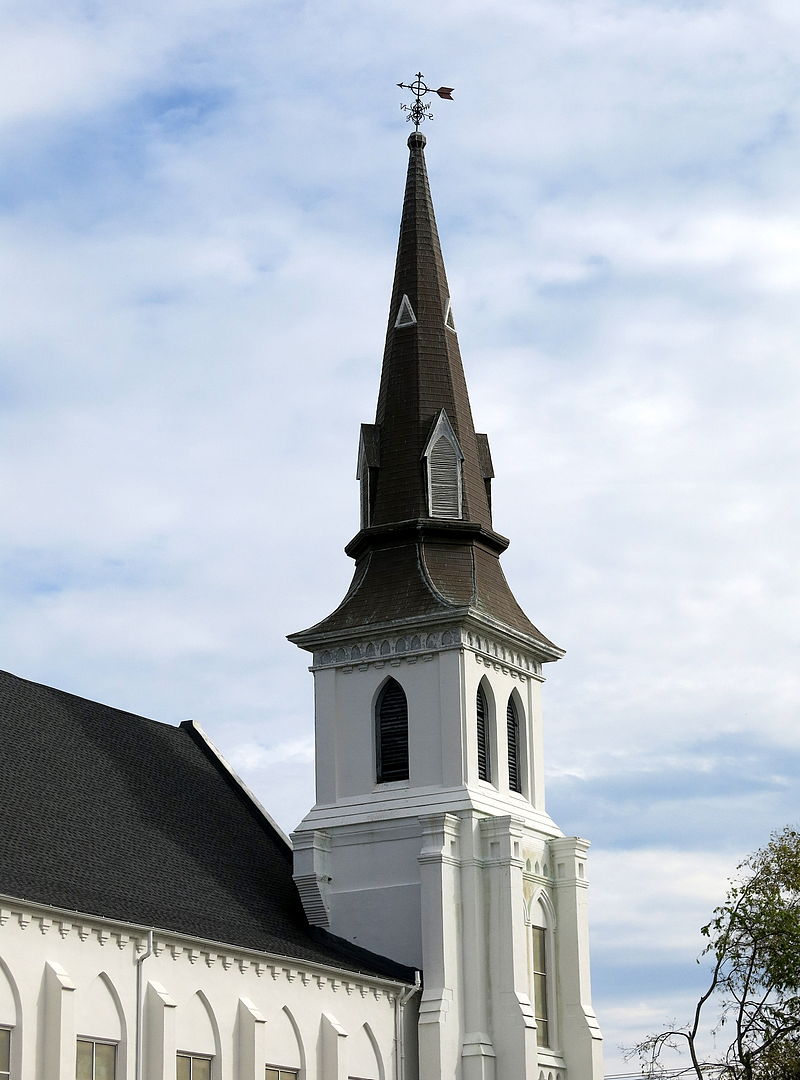Just try to hide when you visit “Mother Emanuel” African Methodist Episcopal Church in Charleston, S.C. They welcome you from the pulpit and ask you to stand. They hand you a microphone so you can give your name and your hometown. Then everyone sings Emanuel’s own welcome song, “Mother Emanuel Welcomes You.” As the song puts it, “We welcome you with our warm embrace.”
Their welcome is genuine, and so was the pain in my heart when I visited Emanuel. I couldn’t help but think of another white guy—Dylann Roof—who was also warmly welcomed to Bible study and prayer with church members on a Wednesday evening in June 2015. I knew before I entered that my feelings would be intense. And so I stood for several minutes and stared at the front of the church from across Calhoun Street, mustering up the nerve to go in.
From where I stood, Emanuel shone white in the morning sun, old, stately, smaller than I expected. No reason to hold back, I thought, and so I crossed the street and climbed the steps. The organist was playing “Great is Thy Faithfulness.” The choir entered and praise filled the sanctuary. But through their praise one can hear the overtones of sorrow and grief so fresh it can scarcely be spoken aloud.
They’ve Been Through A Lot
Phrases like “we’ve been through a lot” stood in for what cannot be described. I heard it when Pastor Eric Manning asked members to attend a funeral for a family affected by the June 2015 massacre and now mourning another death. “They’ve been through a lot.”
Then came a moment I will not forget. Pastor Manning invited the children to come to the front for the children’s sermon. He started by saying that it was Black History Month and that Mother Emanuel has a special place in that history. “Of all the great saints in our church’s history,” he said, “two people stand out the most for me.” These two that he named were the survivors of the shooting. One of the survivors was present, the other represented by a friend. They stood in front of the children, a scene that almost looked too normal.
And yet it is in the routine practices of Christian faith that this tight-knit community of believers came almost immediately to a place of grace and forgiveness so astonishing it silenced a nation.
Amazing Grace
We sang “Lift Every Voice and Sing.” Whenever I sing it, I usually get through the first stanza, the part about the “harmonies of liberty.” And I usually manage the final stanza, “God of our weary years, God of our silent tears . . . ” It’s the second stanza that I find I simply cannot sing, except as a prayer of repentance: “Stony the road we trod, bitter the chastening rod, felt in the days when hope unborn had died.”
Singing it now at Emanuel, I found a line in the second stanza that jumped off the page at me, as if it were written just for the faithful worshipers who stood around me. “We have come, treading our path through the blood of the slaughtered.” Literally. Every week. Including the children. With those words, this great hymn will always be associated in my heart with the good people of Emanuel and what they walk through to worship.
After the sermon came the Altar Call. Pastor Manning invited those who needed to make a profession of faith to come for prayer. Then he issued a more general invitation for all who wanted to come for prayer and a blessing. About half the congregation went up, including me. In that moment, I felt an overwhelming need to pray with these people. Even now, they are in pain, and they need our prayers. But more than that, I know I need what they have—their amazing capacity to forgive, their “Amazing Grace” of which President Obama sang.
And so I went forward to join the line waiting for an open space at the altar. I knelt at the rail until I felt Pastor Manning’s strong hand rest on my shoulder. I had no words, no spoken prayer, only tears.
The Rev. Dr. Ron Cole-Turner is the H. Parker Sharp Professor of Theology and Ethics and teaches courses in the MDiv program including systematic theology, Christianity and evolution, and the Holy Spirit. He’s the author of numerous books including Transhumanism and Transcendence: Christian Hope in an Age of Technological Advancement. He recently spoke in Charleston, S.C. and worshiped at Emanuel African Methodist Episcopal Church.

